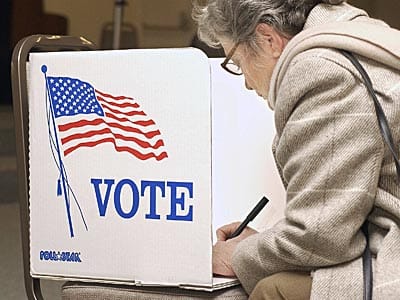Do You Vote for the Lesser Evil?

Credit: Think Progress

It is commonplace in our politics today to view the decision between a Democrat and a Republican is nothing more than a forced choice between competing evils. It can be difficult, however, to find data that might provide us with greater insight into the prevalence of the lesser of two evils mentality among the American voting public.
Fortunately, two new polls may shed a little bit of light on the matter. A Rasmussen public opinion survey published yesterday asked flat out: “When looking at a choice between Obama and Romney, is it a choice you are excited about or will you simply be voting for the lesser of two evils?”
In the poll of 1,000 likely voters, 46% stated they would be voting for the lesser of two evils, compared with only 45% who said they are excited about the choice between the Republican and Democratic party candidates for president.
As moral philosophers have argued down through the centuries, it is rationally impossible to make a conscious choice in favor of evil. On such a view, a vote for the lesser evil between a Democrat and a Republican is not a choice in favor of that candidate but rather a vote against the other candidate, who is perceived as the greater evil. In this sense, the lesser evil mentality can be seen as a form of reaction.
A Quinnipiac University survey released just today can provide us with a bit more insight into this matter. The swing state poll of likely voters in Ohio, Florida and Pennsylvania found that Obama is preferred by at least 50% of respondents in all three of these strategically important states. Interestingly, after gauging its respondents support for the Democratic and Republican party candidates, the survey inquired whether they strongly favor the candidate, if they like him but with reservation, or if they support him only because they dislike the other candidate. The results were quite different from what one might be led to expect from the Rasmussen survey.
In Ohio, where Obama was favored 50% to 44% over Romney, 60% of Obama supporters said they strongly favor the incumbent, while 31% said they like him with reservations and 9% stated that they plan to vote for Obama simply because they dislike Romney. The situation was fairly different among Romney supporters: 42% said they strongly favor the former Massachusetts governor, 35% said they like him with reservations and 22% stated that they support him only because they dislike Obama.
A similar breakdown was found in Florida and Pennsylvania. Floridians preferred Obama over Romney 51% to 45%. Among Obama supporters there, 65% said they strongly favor the president, 24% said they like him with reservations, while 10% stated they support him because they dislike Romney. Among Romney supporters, 49% said they strongly favor the Republican candidate, 29% said they like him with reservations and 19% said they support him because they dislike Obama.
In Pennsylvania, likely voters leaned toward Obama over Romney 53% to 42%. Among Obama supporters, 59% said they strongly favor the Democratic candidate, while 33% said they like him with reservations and just 7% said they support him because they dislike Romney. Likely Romney voters were less enthusiastic: 41% said they strongly favor him, 37% said they like him but with reservations and 22% said they support the Republican because they dislike Obama.
Clearly, the lesser evil mentality is firmly ingrained within the American political psyche: 31% of Ohio voters, 29% of Floridians and 29% of Pennsylvanians will not be voting in favor of Obama or Romney, but rather against the one or the other.
Of course, the presidential contest is not the only race in which many Americans will feel they are forced to choose between two evils. Perhaps if voters began casting their ballots for candidates they do in fact support rather than voting for the lesser evil between the Republican and Democrat, we might find the resulting composition of government less objectionable.
As a final note, it should be mentioned that both polls should be seen as deeply flawed as neither provided respondents with an accurate reflection of the choices that will be available to them on the November ballot, which will include Independent and third party options such as Gary Johnson of the Libertarian Party and Jill Stein of the Green Party.



